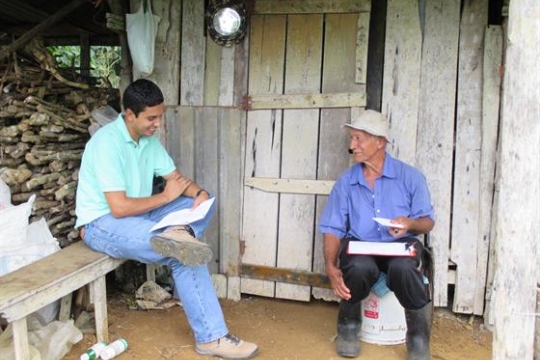High-level research, strengthening of technical capacities and participatory studies allow to understand and disseminate strategies of ecosystem-based adaptation in agricultural systems.
August, 2018. After six years of research, the Ecosystem-Based Adaptation and Smallholder Coffee and Subsistence Farmers in Central America, known as CASCADA, culminated by contributing to the development of adaptation strategies based on ecosystems to reduce the vulnerability of small producers of basic grains and coffee in three Central American countries: Costa Rica, Guatemala and Honduras.
The project was led by Conservation International (CI) and implemented with CATIE (Tropical Agricultural Teaching and Research Center), host institution of EfD-Central America, and the Center for International Cooperation in Agronomic Research for Development (CIRAD).
According to Celia Harvey and Francisco Alpizar, project leader for CI and CATIE, the initiative generated new insights into how small producers are being affected by climate change and explored what adaptation measures farmers are using.
In addition, it strengthened the capacities of more than 2000 producers and technicians in the region, through events and training materials, which allowed them to strengthen their knowledge on the subject of adaptation.
Also, policy options that can support small farmers to adapt to climate change were explored. In this sense, numerous documents were disseminated to help inform political discussions on the subject for broad audiences, from training modules for technical extension agents to its latest scientific publication in the indexed journal Agriculture & Food Security.
"The idea is that the legacy of the CASCADA project, which includes scientific publications, policy summaries, technical and training materials, will continue to be used as a guide to reduce the vulnerability of smallholder communities to climate change," said EfD fellow researcher Bárbara Viguera, who has coordinated the project on behalf of CATIE.
After the closure of the project, Viguera said that CASCADA allowed EfD-CA through CATIE to position itself in the adaptation based on ecosystems, work together and strengthen the research links with CI and CIRAD, two important partners of the institution. At the same time, it involved researchers from several CATIE programs, including EfD-CA host Program in Environmental Economics, the Environmental Modeling Laboratory (currently UMH of the Forests program) and the Latin American Chair in Environmental Decisions for Global Change (CLADA).
Part of the final dissemination efforts include a short video with the main results of the project for all audiences, in the following link you can watch CASCADA's audiovisual: https://www.youtube.com/watch?v=yLWOsrB06M0&t=1s
For general information, publications and key achievements of CASCADA, you can visit the following page: https://www.conservation.org/projects/Pages/sobre-cascada.aspx
CASCADA was funded by the German Federal Ministry of Environment, Nature Protection, Public Works and Nuclear Safety (BMUB), within the framework of the International Climate Initiative (ICI).
